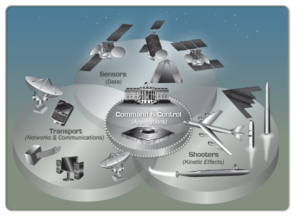NEWS
Nuclear command, control, and communication (NC3) courses offered at CIC
Editor’s Note: Keefer Patterson with Air Force Global Strike Command (AFGSC) Public Affairs published this article in late February on the AFGSC official website to explain more about NC3 courses, who is eligible to take them, and how the nuclear enterprise functions as a whole.
Airmen and civilians assigned to Air Force Global Strike Command are eligible to take courses in nuclear command, control and communication.
 To the untrained eye and mind, a first glance into the nuclear enterprise can be somewhat disorienting. Often referred to as a system of systems, there are many moving pieces that bring together NC3.
To the untrained eye and mind, a first glance into the nuclear enterprise can be somewhat disorienting. Often referred to as a system of systems, there are many moving pieces that bring together NC3.
The NC3 courses taught at the Cyber Innovation Center in Bossier City provide both introduction and education to AFGSC Airmen and civilians alike. These courses ensure participants are informed of the processes in place and how the nuclear enterprise functions as a whole. Furthermore, the courses provide historical context and increase understanding of the U.S. nuclear triad and its importance in keeping a deterrent focused force.
“Understanding the history kind of gives you the bigger picture as to why NC3 is needed,” said Angelia Childs, PhD, AFGSC information technology cybersecurity specialist. “What really wrapped it up for me was when they started talking about the NC3 weapon system. It made more sense learning that it’s not just a weapon but a system of a system.”
Facilitated by Louisiana Tech Research Institute (LTRI) and funded by the Air Force Institute of Technology, there are currently four NC3 courses taught at the CIC, which include NC3 150, 200, 300 and 400.
“These courses are considered professional continuing education,” said Warren Ward, LTRI director of operations. “In the entry-level courses, you learn at the secret classification level how to tie in your role into the bigger picture in supporting USSTRATCOM and the national command authorities. When you get into the 300 level and up courses, we’re going to go into higher classification topics where we will have deeper discussions on the essential functions of NC3.”
From aircraft maintainers to pilots, from cyber specialists to missileers, Airmen and civilians from across the command come to attend the course.
“While adhering to COVID-19 restrictions, I was able to travel in from Minot Air Force Base to take the NC3 150 course,” said Airman Phillip Telles-Ferreira, Minot command post emergency action controller at Minot AFB, North Dakota. “After concluding the course, we toured the Barksdale Command Post and compared some of their set-ups to ours. We also visited the AFGSC HQ and the NC3 Center.”
As time progresses and COVID-19 restrictions lessen, NC3 instructors would like to continue to grow course participation and see more diversity in experience.
“Until pandemic restrictions are lifted, I expect the largest part of our students will come from Barksdale, but we are trying to bring in individuals from other organizations as well,” Ward said. “I think the interaction between participants who come from different career fields at different bases is important to the learning environment. Because the Navy is a big part of the triad, I’d like to eventually get some Navy personnel into the classes as well to really broaden the perspective.”
To those unfamiliar with NC3, ask yourself, “What does NC3 have to do with my job within the nuclear mission?” and consider taking an NC3 course.
For more information on NC3 courses visit ltri.org.
Recent Comments